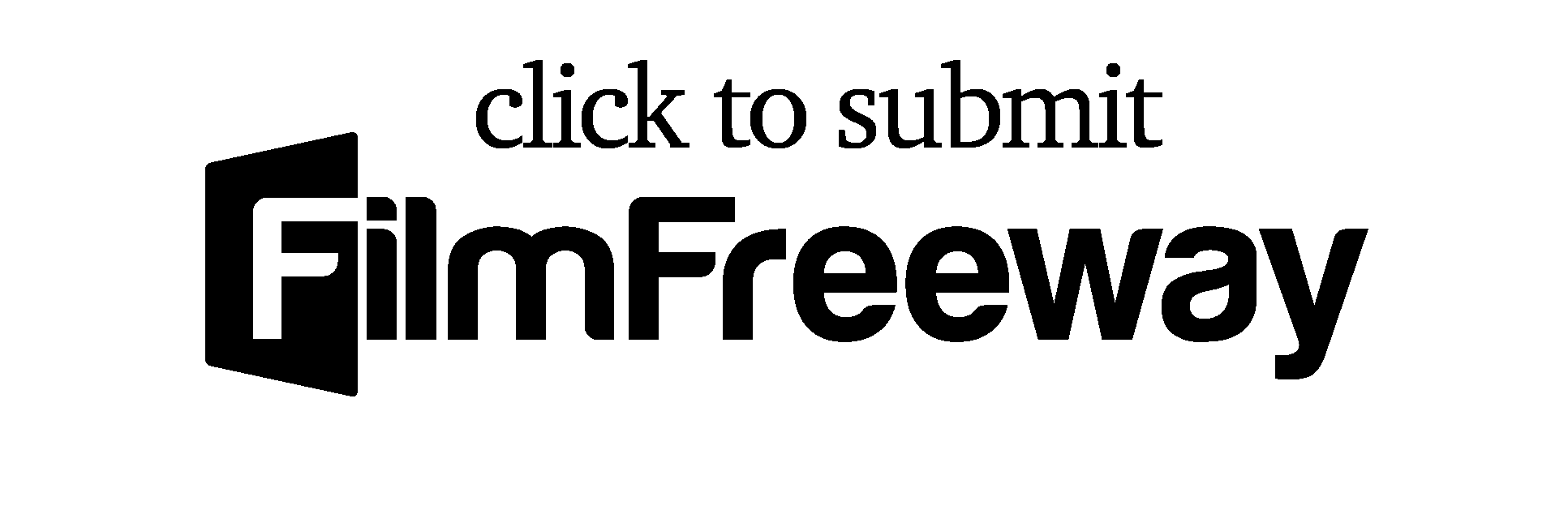
A Philosophical & Aesthetics Analysis
by K. Akrivos, PhD - “Reprise”
(director - Kenji Ouellet)
Reprise by Kenji Ouellet is more than a short film. It is a puzzle in the form of a film. Reprise is designed not only as a short film, but also to serve as a filmic loop for an art installation. The director describes it “as a playful narrative experiment of a critical nature - a riddle in a seamless loop”.
Reprise is much more than a showcase of numerous means of filmic deception; it is a noteworthy attempt to introduce viewers in a puzzlement mode liable to trigger philosophical questions.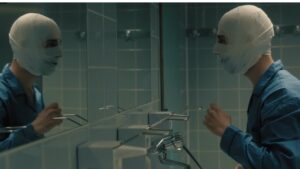
Story:
As is customary in any film, the viewer expects a story to unfold. In Reprise the story unfolds not to conclude, but rather to refute itself. Due to self-refutation, the story in Reprise is not particularly meaningful. It does not establish a finality ensuring that the events depicted are so concrete that if changed the plot would collapse. This is not the case here; the story events can be changed, replaced, omitted and this happens very soon in the film.
Big and extreme close ups introduce us to the intimacy of a passionate love story expected to unroll. Early in the story, this intimacy is violently interrupted; we are displaced from our perspective to realize that what we’ ve just seen is not real. This plot twist will occur over and over making us even more suspicious and disbelieving towards whatever will follow.
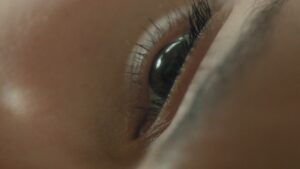
The director implements this unorthodox narrative by exposing us to a series of plot deceptions and script twists.
Kenji Ouellet does not aim to conclude his story on a perhaps less unexpected finale, but rather to instigate puzzlement and uncertainty. In the case of using the film as a loop for an art installation, Ouellet aims at embarking us on a perpetual, inescapable circle of wonder and ambiguity.
Ouellet is uncomfortable to settle on a sole version of events sequence. Are events interchangeable? Are they important at all? Is it permissible for events to be in a loop? Can anything important and meaningful be in a loop?
Reprise instigates questions and imposes puzzlement. This is important in itself.
Reprise is not about its story. It is not intended to tell a story but to puzzle viewers. Not only by posing a series of riddles or paradoxes but being a puzzle itself.
A Catalog of tricks:
Ouellet uses means of trickery and mind-bending devices to such an extent that he describes his film as a “a catalog of every single type of plot twist found in cinema (retroactive dream presentation, lying flashback, unconscious death, hidden split personality)”.
This gives the film a playful and self-refuting narrative character that shatters any chance for a finite, finalized story outcome. Very soon we'll ask the question why? Why does he employ all these means of deception in a single short film? Is his concern to ensure that we will not escape puzzlement?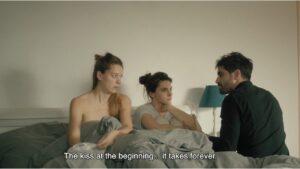
Ouellet is well aware that this oversupply of deceptive means works against its purpose. It will not allow any of these means to deploy successfully and capture us. One’s deployment reduces the other. Still the director persists in including all of them in an exorbitant sequence. What does he try to accomplish?
We assume that by adopting this extended list of tricky means he reveals something more than a desire to trick us. But it is not apparent to us.
Does he choose this narrative manner to question the persuasive powers of filmic depiction? Or to question perhaps any possibility of establishing reality in a medium such as cinematic reproduction? Does he want to underline the artificiality of the filmic “reality” in which everything is fabricated? Is his intention to make a comment on the temporariness of art itself, or even more, to set up a meaningful game about time and temporal sequence?
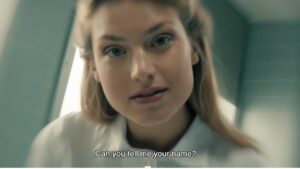
Crafted to be a loop:
Reprise is crafted so that the film can be a loop itself.
The loop is a very special form of narrative based on repetition, but extending further (1). The loop is a dominant means of processing and redefining temporal sequences and in doing so it affects content as well as viewer’s perception of time.
Ren Adams (2) claims that “Loops are powerful invocations, abandoning linear narrative for the intensity of a continuous present, capable of establishing, disrupting and directing temporal relationships (…) Woven into longer segments, loops can even establish a haunting sense of repetition and reappearance, affecting the viewer's relationship to the viewed and the recalled. This flexibility allows loops to serve as an effective investigation into the conflated space of time and memory (…)”. Jean Epstein, in his Coeur Fidèle discovered a psyche in loop narrative: “In avant-garde films of the 1920's, repetitions and looped sequences were employed to deliberately work against narrative development for either poetic or purely optical effects. (...) This machine that stretches or condenses duration, demonstrating that variable nature of time, preaching the relativity of all measures, appears to be endowed with a psyche (…) (3)”
If Reprise builds a riddle in its plot entrapping the viewer in puzzlement, when serving as a loop, it is expected to drive us deeper. It would reveal an intention to entrap the viewer in a more profound, more inescapable puzzlement. Because a loop captures someone in an infinite circle of repetition which appears inescapable. A loop of puzzlement could be inescapable and hence permanent (4). Repetitiveness is a key dispute of any possibility to produce meaning for the viewer. But then, the loop itself could be the meaning.
The loop, as a perpetual repetition of things, can serve in two contrasting ways. Firstly, in a loop a unique entity loses its uniqueness as it is repeated. By canceling the uniqueness of the repeated, the loop reduces or eliminates its importance. The previously unique entities when within a loop are part of an infinite crowd of clones.
On the other hand, Reprise could be an inducement to reflect on a different perception of the loop effect; the Nietzschean idea of Eternal return (5) . Eternal Return is a philosophical idea which states that time repeats itself in an infinite loop where all events will repeat themselves eternally. In eternal return repetition becomes the decisive criterion for what is worthy to repeat infinitely. If our choices and deeds were to be infinitely repeated, a powerful internal urge would rise.
An urge which could lead us to identify and select the most worthy and qualified choices and deeds to repeat themselves eternally. In that sense the loop reveals a criterion for our life and the meaning of life.
I would not claim that Reprise, in addition to triggering puzzlement, directly transmits such a Nietzschean philosophical message. Nor has it clearly articulated questions concerning time, reality, meaning of life, ephemerality, importance, perception and more. But it has helped us notice that, to an extent, our lives are organized in loops, regarding everyday repetitiveness and daily routines. It has also implied that if events can somehow be interchangeable there is an issue with their importance.
In either case, Reprise has managed to puzzle us and this is philosophically prolific.
(1) “Something more than repetition, loops emphasise the cyclical and dissolve beginnings and endings into continuous flow” Will Luers, Narrative Potentials of the Loop.
(2) “Haunted Temporality: The Loop as Semi-Narrative Engine”, Renee Adams
(3) Coeur Fidèle, by Jean Epstein in Ren Adams “Haunted Temporality: The Loop as Semi-Narrative Engine” Southwest University of Visual Arts, Fine Arts.
(4) Repetitive structure prevents a clear understanding of beginning, middle and end, erasing our reliance on static waypoints while expanding a single moment into a potentially infinite, self-spiralling universe. This allows contemporary artists to manipulate the viewer's relationship to time and memory (even to place and event), just as the use of repeated sequencing in television programs reinforces the viewer's sense of flow, place and character by offering a mosaic of recorded experiences the viewer must link by viewing. Fiske, John, and John Hartley. Reading Television. p.62, Florence: Routledge, 1978.
(5) Eternal Recurrence, “Ewige Wiederkunft” by Friedrich Nietzsche: The Gay Science, 341: What if some day or night a demon were to steal after you into your loneliest loneliness, and say to you, "This life as you now live it and have lived it, you will have to live once more and innumerable times more; and there will be nothing new in it, but every pain and every joy and every thought and sigh and everything unutterably small or great in your life will have to return to you, all in the same succession and sequence" ... Would you not throw yourself down and gnash your teeth and curse the demon who spoke thus? Or have you once experienced a tremendous moment when you would have answered him: "You are a god and never have I heard anything more divine."
-Short Encounters, 2023-

